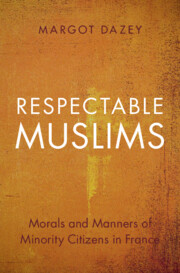Book contents
- Respectable Muslims
- Cambridge Studies in Social Theory, Religion, and Politics
- Respectable Muslims
- Copyright page
- Contents
- Acknowledgments
- Note on Transliterations and Translations
- 1 The (Un)Making of Respectability
- 2 Proving Frenchness
- 3 Allaying Suspicions
- 4 Keeping Order
- 5 Practicing Discreetly
- 6 Uplifting the Community
- 7 Facing Hostility Graciously
- 8 Respectable Citizens in Uncertain Environments
- Bibliography
- Index
6 - Uplifting the Community
Deserving Muslims in Liberal Times
Published online by Cambridge University Press: 18 December 2024
- Respectable Muslims
- Cambridge Studies in Social Theory, Religion, and Politics
- Respectable Muslims
- Copyright page
- Contents
- Acknowledgments
- Note on Transliterations and Translations
- 1 The (Un)Making of Respectability
- 2 Proving Frenchness
- 3 Allaying Suspicions
- 4 Keeping Order
- 5 Practicing Discreetly
- 6 Uplifting the Community
- 7 Facing Hostility Graciously
- 8 Respectable Citizens in Uncertain Environments
- Bibliography
- Index
Summary
Muslim leaders of the UOIF further cement their claim to respectability through an elite project of community-building. This project consists of forming a respectable class of Muslims who embody the petit bourgeois values of hard work, politeness, and individual responsibility. This is concretely enacted through various institutions, starting with private Muslim schools, and implemented through a range of regular activities, such as reading groups, diploma ceremonies, and self-development workshops. This chapter draws on comparisons made with Black elites in the US and upper-class Jews in nineteenth-century Europe to show that French Muslim leaders’ uplift ideology is also scripted into bodies. Physical exercise, hygienic practices, and appropriate outfits comprise the primary medium of perfectionist politics seeking dignity. These politics are articulated using the language of Islamic virtues – the centrality of education is predicated upon the Quranic injunction iqrāʾ (“read”), the search for professional accomplishment is understood as a duty of iḥsān (excellence), and the importance of behavioral exemplarity is reasoned in reference to ādāb (good manners) and akhlāq (ethical conduct). These moral principles, however, are also consistent with neoliberal definitions of social worth and rely on the continuous erection of boundaries against lower-class, “undeserving” coreligionists.
Keywords
- Type
- Chapter
- Information
- Respectable MuslimsMorals and Manners of Minority Citizens in France, pp. 148 - 179Publisher: Cambridge University PressPrint publication year: 2024

